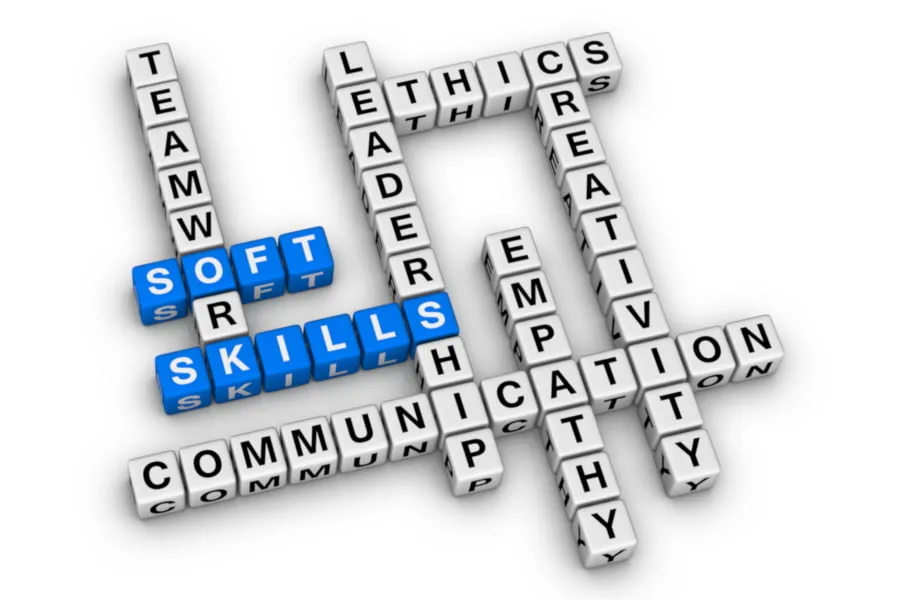Soft Skill Training
For every employee, beyond their technical skills, it is crucial to have some basic soft skills. These include work ethics, attitude, leadership, teamwork, problem-solving, communication skills, social intelligence, emotional intelligence, cultural competence, and a whole host of other personal attributes. Our Soft Skill training enables you to transform your resources.
During lean times, an employer will retain an employee if and only if the employee has some of the critical skills such as leadership, good communication, team player, etc. Soft skills requirements differ from occupation to occupation. So, Soft Skill Training should be customised based on the job profile.
For example:
Teachers require soft skill training in leadership, communication, teamwork, problem-solving, social and emotional intelligence, and cultural competence. In contrast, accountants require soft skill training in skills, communication, problem-solving, organization, customer orientation, teamwork, and task management.
Soft skills for Digital Age Employees
The rise of artificial intelligence and automation is changing the current workforce and moving to a stage where every employee is technically replaceable. The only differentiating factors for employees and value add to companies are soft skill such as interpersonal skills, leadership skills, creativity, problem-solving skills, emotional intelligence, etc.
Studies by MIT Sloan found that soft skills training, even in a factory setting, could improve work productivity in an organization.
Emotional intelligence
Emotional intelligence is often referred to as the ability to recognize and manage your emotions and the emotions of others. Emotional intelligence is applicable for an employer / employee / student. With a high emotional intelligence quotient, you as an employer / employee / student will be looked upon as an easy-to-work with person.
Emotional intelligence is widely recognized as a valuable skill that helps improve communication, management, problem-solving, and relationships within the workplace. It is also a skill that researchers believe can be improved with training and practice.
Through our training programs, students will be able to better handle interpersonal relationships with a strong sense of empathy. They will also be in a favorable position to monitor the emotions of others and will come up with well-informed perceptions about others’ behavior and thinking patterns.
Time Management
“Time management” is the process of organizing and planning how to divide your time between specific activities. Good time management enables you to work smarter – not harder – so that you get more done in less time, even when time is tight, and pressures are high.
Employees who lack time management skills typically do not know how to prioritize their work. Such employees generate waste and in turn will impact the performance and growth of the company. Ask the following questions to understand the gaps within
- Are employees overworked or are employees inefficient?
- Are there delays in delivering orders?
- We, Agate Training Services, will assist you to identify the gaps and propose systematic trainings.
Adaptability
Society, technology and organizations changing rapidly. Adaptability is one of the 5 most in-demand soft skills according to LinkedIn. Adaptability is all about being flexible and embracing change. Employees who do not adapt to the changes not only leave them behind, they also slowdown the progress of the organization.
Change is inevitable. Leaders and employees all over the world are facing constant change and complexity, including environment changes, culture changes, technological changes, market changes and competitors. Adaptable workforce will be curious, open mind, flexible, and will plan ahead without fear of failure.
Problem Solving
Problems are an inevitable part of life and work is no exception. Every organization has a need for strong problem solvers. According to American Society for Quality, Problem solving is the act of defining a problem; determining the cause of the problem; identifying, prioritizing, and selecting alternatives for a solution; and implementing a solution.
This is one of the most important skills as far as soft skills go. Financial Times polls with recruiters ranked problem solving as one of the five most important skills for an employee. Problem-solving will help every employer, employee and students tackle their challenges while chasing their dreams. Our problem-solving training will help trainees to tackle the problem in a systematic way.
Communication
Communication is one of the most important soft skill an aspiring employer or employee should poses. In this digital age, everyone should be expert in handling communication through digital platform as well as though face-to-face interaction.
We have range of communication courses designed to accommodate both face-to-face interactions and digital age communications like email, chat and video conferencing.

Soft skills for Teachers
Being a teacher is more than just imparting knowledge; it’s about inspiring, guiding, and shaping the minds of future generations. Effective teaching goes beyond subject matter expertise; it requires a unique set of soft skills that enable educators to connect with students, create engaging learning environments, and foster growth and development. At Agate Business Consulting, we recognize the importance of these soft skills in cultivating a positive and enriching educational experience for our students.
Communication Skills
Effective communication lies at the heart of teaching. Teachers must be able to convey information clearly and concisely, adapting their communication style to suit the needs and learning styles of individual students. Whether explaining complex concepts, providing feedback, or facilitating discussions, strong verbal and non-verbal communication skills are essential for building rapport, fostering understanding, and creating a supportive learning environment.
Empathy and Patience
Empathy and patience are fundamental qualities that enable teachers to connect with students on a deeper level and understand their unique challenges and needs. By demonstrating empathy, teachers can create a safe and inclusive space where students feel valued, respected, and supported. Patience is equally crucial, allowing educators to provide encouragement, guidance, and support as students navigate the learning process, overcome obstacles, and reach their full potential.
Adaptability and Flexibility
In today’s ever-changing educational landscape, adaptability and flexibility are essential traits for teachers. From adapting lesson plans to accommodate diverse learning styles to embracing new technologies and teaching methods, educators must be open to change and willing to adjust their approach to meet the evolving needs of their students and the curriculum. By remaining flexible, teachers can effectively navigate challenges, seize opportunities for innovation, and inspire a culture of lifelong learning.
Creativity and Problem-Solving
Creativity and problem-solving skills are indispensable for fostering innovation and critical thinking in the classroom. Teachers who think creatively can engage students through interactive activities, projects, and discussions that spark curiosity and encourage exploration. Moreover, by cultivating problem-solving skills, educators empower students to tackle challenges, think analytically, and develop solutions independently, preparing them for success both inside and outside the classroom.
Organizational Skills
Effective classroom management and lesson planning require strong organizational skills. Teachers must be able to manage their time efficiently, prioritize tasks, and create structured learning environments that optimize student engagement and productivity. By maintaining well-organized lesson plans, materials, and resources, educators can minimize disruptions, maximize instructional time, and create a conducive atmosphere for learning and growth.
In summary, teachers who possess these essential soft skills are not only able to deliver quality education but also inspire, motivate, and empower their students to reach their full potential.
Leadership and Teamwork
Regardless of the age level of your students, it is important for you to possess leadership skills that help you work effectively with and garner respect from students, parents, other teachers, school management, and the community.
With the emphasis on collaborative professional learning communities, working as a group to push innovation or resolve challenges has become even more important. Teamwork in an educational setting involves parties sharing mutual goals and working together to reach them. The ability to work well in and with teams impacts your students, parents, colleagues, administrators, and other key stakeholders.
Register with us now!
Transform your business with us!
Schedule a free consultation with our team and let’s make things happen!
